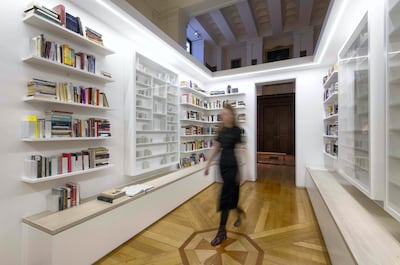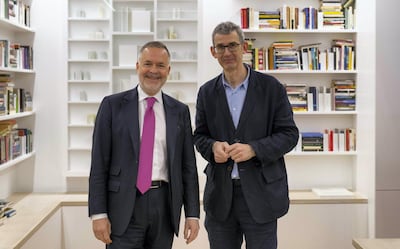Stacked on a table in Edmund de Waal's studio in south London is today's post – a dozen or so packages from various bookshops. They will be unwrapped and added to the artist's Library of Exile, a collection of more than 2,000 titles written by people forced to leave their countries of origin for political reasons, from the Roman poet Ovid to children's author Judith Kerr. The books are to be donated to the library of the University of Mosul, in Iraq, after being displayed at the British Museum in London from tomorrow.
"I've just realised we will need the complete works of Freud," says de Waal, looking at the new editions. His studio manager has reminded him that the pavilion de Waal, built to house the library, is already full. "They just have to be in," the artist replies with a shrug.
The library is a personal project for de Waal, otherwise known for his ceramics. He is part of the Ephrussi family, a Jewish dynasty forced to flee Vienna by the rise of Nazism in the 1930s. It is a history he immortalised in his 2010 bestselling memoir The Hare with the Amber Eyes, which traced their changing fortunes through a collection of Japanese netsuke figurines.
“The library came from thinking about our lost life in Vienna, the destruction of our library there, and my father becoming a stateless refugee. Over the last couple of years there has been this drum beat of toxicity around migration and refugees and I thought how I’m only here because my dad was allowed to come to Britain as a child.
“I wanted to do something incredibly positive and make a library. A place that has all these voices of people who have been forced to bring their language from one place to another.”
A small percentage of the books come from de Waal's personal collection, but he bought most of them for the project. Some were donated by visitors to the Venice Biennale last year, at which he launched the project, and during the months in which it was shown at the Staatliche Kunstsammlungen in Dresden last year. Among the new titles stacked on the studio floor ready for cataloguing before the latest London stop is Iranian writer Marjane Satrapi's graphic novel Persepolis, a collection of short stories by Somalian writer Maxamed Daahir Afrax and Women Who Blow on Knots, Turkish writer Ece Temelkuran's magic realist portrait of the Arab uprisings.

Each will have a label attached to the inside front cover, in which visitors are encouraged to write their name or a dedication if they feel a particular connection to a title. All are shelved according to the authors' countries of origin. "It's not a didactic collection, it's not a library that says that because you are in exile you have to write about being in exile, but certainly there is a whole chunk of mid-20th-century literature from Germany and Austria that talks about homelessness. And there's a great load of contemporary Syrian and Lebanese writers producing an exilic literature. There are threads from Ovid to people writing now. There are moments of wonderful, painful connection.
"I wondered whether this library should be endlessly travelling around the world and I thought, 'no it needs a home, and it should go to Mosul'. That particular destruction of the university library by ISIS seemed so grotesque."
From the outset of the group's occupation of the Iraqi city, the university became a target, with books burned and staff intimidated. In 2015, what was once one of largest libraries in the Middle East, with more than a million titles, including journals dating back to the second century and versions of the Quran from the 19th century, was reduced to rubble.
At the time, Unesco described the actions as "cultural cleansing" and "one of the most devastating acts of destruction of library collections in human history". De Waal is working with the charity Book Aid International to support the library's reconstruction.
Written on the walls of de Waal's pavilion is "Where they burn books, they will in the end also burn people," a quote from 19th-century German poet Heinrich Heine. "It's an absolute truth," de Waal says. "Once you identify a literature that 'should not exist,' it's barely a step to saying the people who wrote and read it should not exist, either."
The library project comes as de Waal applies for Austrian citizenship, a process brought about by a change in the law that allows the descendants of Holocaust victims to return to the country to live. "It is massively significant for my family, for my dad, who saw his father die stateless, for the memory of my grandmother, who did not make it out. It puts that history to rest. It also happens at a time when the toxicity of Brexit has been so grotesque. I'm completely European, my family is completely European, to be told you are not European is appalling."
Given that the issue of return is fundamental to de Waal, did he have qualms about exhibiting at the British Museum, which is under increasing scrutiny for the colonial provenance of much of its collection? Last month, Greece made a return of the Elgin Marbles, a group of classical sculptures removed from the Parthenon by the British in the early 19th century, a prerequisite for any trade deal with the European Union.
The artist is uncompromising in his reply. “Where an object has been looted there is an absolute moral compulsion to give it back to those from whom it was taken. The museums are, thankfully, catching up with that and it’s long overdue.”
But the British Museum has been resistant. De Waal is adamant. “In the next decade we will, for example, see the Benin Bronzes go back to Nigeria.
The act of restitution also creates a space for empathy; it creates a space where you empathise with other communities who have lost their culture. Look at the Syrians, the Iraqis in Mosul. They lost absolutely everything they had. They lost family, tragically; their homes, their possessions. Returning objects is not just transactional, it's about giving respect back to people who had it taken from them."
Edmund de Waal’s installation Library of Exile will be on display at the British Museum, London, from tomorrow until September 8, 2020


